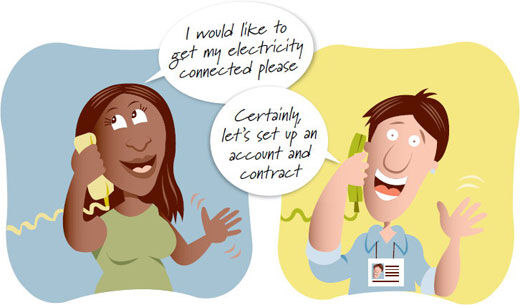
To buy energy, you enter into a contract with a retailer. The retailer then contracts with the distributor to connect your property to the network and supply energy.
Types of contracts
There are two types of contracts a retailer may offer:
standard form contracts or non-standard contracts.
Standard form contracts
Retailers who want to supply energy to residential and small business customers must have a standard form contract approved by the ERA.
Copies of the approved standard form contracts of electricity and gas licensees are available on our website (erawa.com.au).
Non-standard contracts
You and the retailer can negotiate terms and conditions different from the standard form contract. This is called a non-standard contract. Although a non-standard contract does not require the ERA’s approval, it must still comply with the relevant laws. If you choose to have a non-standard contract, be sure to carefully check the terms and conditions of the agreement.
What happens if you don’t enter into a contract?
If you use energy in your home or business without contacting a retailer and entering into a contract, you are ‘deemed’ to be supplied under the standard form contract of the retailer assigned to your property.
Is there an obligation to supply energy?
Electricity
Synergy and Horizon Power are the only retailers who must supply you with electricity if you request supply, and:
- your property is:
- connected to the distribution network; or
- not connected to the distribution network but within 100 metres of the distribution network (subject to certain conditions); and
- you do not have an outstanding debt or, if you do have an outstanding debt, you have made an arrangement to pay the debt.
Synergy and Horizon Power have to offer to supply you electricity under their standard form contracts.
Gas
Gas retailers can offer to supply you under their standard form contract, or a non-standard contract. You should check the terms of the contract offered to make sure it is right for you.
If a gas retailer agrees to supply you, it may impose certain conditions, for example, requiring you to pay an outstanding debt or requiring a security deposit.
Marketing
Marketing agents and retailers may approach you in person, by telephone, post, fax or email to promote the services of a retailer. Marketing agents and retailers must follow national and state rules when marketing energy to you. These rules include that marketing agents must:
- identify themselves when approaching you and explain who they are;
- provide a complaints telephone number;
- provide you with certain information before, during and after you enter into a contract; and
- not contact you outside the permitted call times.
When visiting your premises, marketing agents and retailers must comply with any no canvassing or no advertising (no junk mail) signs. You must make sure these signs are clearly visible to the marketing agent or retailer.
You can also register your telephone number with the Do Not Call Register. Listing your number with the Register ensures that you do not receive telemarketing calls from all sources (not just energy retailers). For more information, ring 1300 792 958 or go to the website at www.donotcall.gov.au.
Australian Consumer Law
The Australian Consumer Law (ACL) is a single, national consumer law that applies to all businesses.
The ACL includes:
- unfair contract terms law covering standard form contracts;
- the provision of statutory consumer guarantees, replacing existing laws on warranties and conditions; and
- unsolicited consumer agreements, which replaces existing State and Territory laws on door-to-door sales and other direct marketing.
In Western Australia the ACL is enforced and administered by the Department of Commerce (Consumer Protection) and the Australian Competition and Consumer Commission (ACCC).
Further information on the ACL can be found at www.consumerlaw.gov.au.

